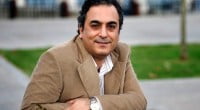More Divisions, More Democracy

Date posted: December 11, 2013
Mustafa Aky0l
Foreign journalists writing about Turkey like to focus on the most fundamental divide in Turkish society: the rift between religious conservatives and secularists. But these days an internal clash is raging among the conservatives themselves. And it could be a boon for Turkish democracy.
On one side are the supporters of the prime minister, Recep Tayyip Erdogan, who is enjoying his 11th year in power and facing increasing criticism for his authoritarian style of rule. On the other side, there are the supporters of Fethullah Gulen, an Islamic scholar and preacher who now lives in Pennsylvania, and whose teachings have inspired Turkey’s most powerful civil society group.
Until a few years ago, Mr. Erdogan’s Justice and Development Party (known as the A.K.P.) and the Gulen Movement, as it is often called, were very close allies. They had a common enemy: the staunchly secular military, which menaced both religious conservatives and democracy itself, having staged or threatened many coups. Many of Turkey’s secular liberals had joined this alliance, hoping that the taming of the military would take Turkey closer to European-style liberal democracy.
However, once the military was subdued in 2010-11 — partly through controversial legal cases in which hundreds of officers were sentenced to long prison terms — this alliance of Erdogan supporters, followers of Mr. Gulen and liberals began falling apart. Gradually, most liberals withdrew their support from Mr. Erdogan, arguing that he had begun imitating the authoritarian habits of his predecessors.
At the same time, differences between the A.K.P. and the Gulen Movement began to surface.
The Gulen Movement, though it is pious and unmistakably Muslim, has always steered clear of Islamist ideology. Unlike the Islamists, who constitute an influential strain within the A.K.P., Mr. Gulen’s followers have always valued Turkey’s relations with the West, championed accession to the European Union, and have been friendly toward Jews and Christians. In return, some paranoid Turkish Islamists (and even some secular nationalists) have accused Mr. Gulen of being a “C.I.A. agent.”
But there is another, more complicated layer. The Gulen Movement is known to have many members within Turkey’s judiciary and police force. Many believe this “state within a state” began to act hawkishly against its opponents, including secular generals, certain journalists and Kurdish separatists, leading to many controversial arrests.
These tensions peaked in February 2012, when an Istanbul prosecutor summoned Hakan Fidan, the head of Turkey’s intelligence agency, to question him about his covert negotiations with Kurdish militants. Since Mr. Fidan is a high-level confidant of Mr. Erdogan and has tried to broker a peace with the militants on Mr. Erdogan’s orders, the prime minister perceived the prosecutor’s move as a personal attack. He hastily passed a law that gave immunity to Mr. Fidan, and trained his sights on the Gulen Movement, which he believed was behind the attack on Mr. Fidan.
Mr. Erdogan then initiated a purge within the police and the judiciary, demoting suspected members of the Gulen Movement. Last month, the clash escalated when the prime minister announced that private weekend schools that prepare high school students for national university admission tests would be shut down. The Gulen Movement operates many of these schools, which are both a source of revenue and recruits. “By closing these schools,” a prominent Gulen follower told me, “Erdogan wants to dry our grass roots.”
The political fallout could be significant. Mr. Erdogan has lost the formerly unwavering support of the Gulen Movement, whose voting power is estimated to make up about 2 to 5 percent of Turkey’s electorate. There will be consequences in the coming local elections, and the presidential elections of June 2014. Although all other religious groups seem loyal to Mr. Erdogan, the lack of pro-Gulen votes could tip the balance in favor of other candidates.
It is beneficial for Turkish democracy that not all religious conservatives are united under one banner. Thanks to the A.K.P.-Gulen rift, Turkish media is today more diverse, as pro-Gulen newspapers like Zaman and television stations are offering a third way between Mr. Erdogan’s supporters and his diehard opponents.
The Turkish state has encroached far too much on the rights of the media, universities, NGOs and the lives of ordinary citizens. It has become a leviathan that must be tamed. If Turkey is lucky, this rift might help bring the country to a democratic equilibrium where the prerogative of the state and the rights of civil society and the individual can be properly balanced.
Mustafa Akyol is the author of “Islam Without Extremes: A Muslim Case for Liberty.”
Source: The New York Times , December 11, 2013
Tags: Democracy | Fethullah Gulen | Hizmet and politics |
























